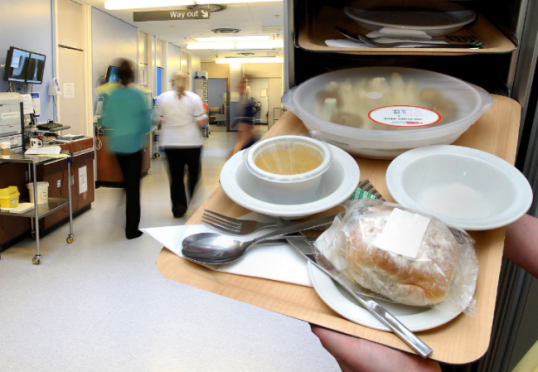A frightening catalogue of hygiene failures which halted cold food preparation for patients at the north-east’s flagship hospital for more than six months can be laid bare today.
NHS Grampian has finally been allowed to restart full operations at Aberdeen Royal Infirmary’s kitchen after environmental health enforcement notices were lifted.
The public had been kept in the dark about the nature of the contamination risk, which included raw meat and trifle destined for children’s wards being stored together – against basic safety rules.
But the Press and Journal, which first revealed the issue in December, has now been given official reports compiled by Aberdeen City Council’s environmental health officers.
Over more than 30 pages, they express shock and concern about a lack of basic precautions being taken to protect patients and staff from food poisoning.
Critics responded the failures were another symptom of the severe budget constraints facing the health service.
Inspectors are believed to have been on a routine visit in September when they were asked to double-check the kitchen amid fears that an ongoing health scare could be traced back to contaminated food prepared at the hospital.
The NHS has declined to disclose the nature of that outbreak, citing “patient confidentiality”.
But, within days, the council’s experts had seen enough to issue bans on the production of cold meals and the use of a meat slicer.
Preparation was transferred to the Royal Cornhill Hospital with meals transported to ARI in refrigerated vehicles.
Food worth hundreds of pounds was dumped as a precaution.
The board accepted it was guilty of a “very disappointing” failure to meet standards – but said it had made a “significant investment” in equipment and training.
That included £300,000 repairing and replacing trolleys that had remained in use “for some time” despite staff knowing cold food was being kept in them at up to four times the required temperature.
But while the most serious problems were dealt with – including buying a meat slicer that met minimum standards – issues remained.
Follow-up inspections in February found a “significant risk” from dishwashing techniques, out-of-date steak and a hand-wash basin with no water.
It was not until a visit on April 27 – where environmental health officers noted the “significant time and effort” put into improvements – that the bans were formally lifted.
The inspection reports – which Aberdeen City Council declined to release while the bans remained in place – paint a picture of a chaotic operation.
Policies were said to be “confusing and contradictory”, raw and cooked foods were regularly mixed, dirty water was poured down food prep sinks, staff failed to wash their hands after touching noses and mouths and had little idea how old food was.
There was particular criticism of a “serious deficiency” in identifying potential problems for patients with allergies.
Inspectors expressed incredulity that staff told them allergens – which include such common items as milk and nuts – “were not handled in the kitchen”.
They added: “It would appear that there is a serious deficiency in understanding of allergen controls as it was readily apparent multiple allergens are handled.”
Professor Jamie Weir of the Patient Action Coordination Team said: “This is really not acceptable. These are simple, straightforward things.
“It is a symptom of the underlying problems NHS Grampian has – the difficulty of getting staff at the right level and the resources they have.”
Unison maintained its members across NHS Grampian were “struggling to get training due to workload and vacancy levels”.
Linda Clark, a non-executive member of the board until this week when she retired as an Aberdeenshire councillor, said she was “really disappointed”.
She added: “I am really, really saddened about this.
“I have worked in a hospital kitchen. I know how important this is.”
A spokeswoman for NHS Grampian stated: “We clearly fell below statutory standards – and our own – which is very disappointing.
“We have worked closely with the environmental health officer throughout and all points raised have been actioned.
“Significant investment has been made in new equipment, infrastructure and staff training.
“Patients, relatives, staff and any other visitors to our sites should continue to have full confidence in the quality and standard of the food we produce.”
She said there was “absolutely no evidence that the health of any patient and/or staff members was affected”.
Internal inspections are now supposed to be carried out twice a week instead of monthly and all staff “have been retrained and fully briefed as to the consequences of failure to follow procedures in the future”.
No disciplinary action has been taken.
The Cairngorm Cafe and Aroma Coffee were unaffected.
